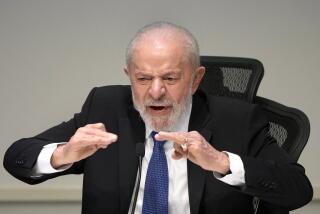Foes Fear Regime May Cancel Chile Vote
SANTIAGO, Chile — The coalition of Chilean opposition parties Wednesday said Gen. Augusto Pinochet’s forces may be provoking conflict as a pretext to cancel a presidential plebiscite scheduled for next week.
Patricio Aylwin, president of the No Command, said the majority opposing Pinochet in the yes-or-no vote is growing daily. In the face of imminent defeat, he warned, the government might “attempt to create a situation that seeks to invalidate the vote.”
The balloting next Wednesday will decide whether Pinochet, who took power in a coup in 1973, serves another eight years in office. If the No movement defeats him, multi-party elections will be held in late 1989, and the opposition will press the government to speed the return to full democracy.
Aylwin’s statement, read at a news conference attended by the leaders of all 16 parties in the coalition, marked the first open declaration of concern by the opposition that the government might resort to canceling the vote or somehow negating a No victory.
Privately, some opposition leaders have expressed those fears as indications have increased that Pinochet could lose decisively. Government supporters insist the 72-year-old general is still ahead.
Aylwin, president of the Christian Democratic Party, Chile’s largest party, said that if the government intervened to deny a genuine victory by the No Command, “we will call for peaceful but massive actions. We will use all legal means and will appeal to the international conscience (and) to the armed forces” to ensure that the result is acknowledged.
At the same time, he called on government opponents to vote peacefully and to help maintain absolute calm during the plebiscite and the vote count. He added that No supporters will monitor voting to ensure a fair count.
“Nevertheless, we have grounds to fear that the government might retard or tamper with the results in an attempt to deny the triumph of the No,” he said. Therefore, he added, the No campaign will conduct a sample computer count to verify the government’s tally.
No Regime Response
The government did not respond to Aylwin’s remarks. Pinochet and other leaders of the Yes campaign have said the government will respect the outcome, but will not revise the political timetable calling for Pinochet to remain in power for another year if he loses.
The government has emphasized statements by leaders of the banned Communist Party in which they call for a popular uprising if Pinochet wins, and for street demonstrations if he loses. Aylwin repeated the No Command’s position that the Communists, while endorsing a No vote, are not part of the coalition. In the event of victory, the No campaign has called for orderly negotiations with the armed forces to negotiate a transition government.
The Communist Party backed the government of Marxist President Salvador Allende, who was overthrown in the bloody 1973 coup. The government has sought to suggest that a No victory would bring a return to the violence, expropriations and shortages of Allende’s regime, however.
Aylwin, who initially supported the coup but has emerged as principal spokesman for the anti-Pinochet movement, said organizers were looking into charges that government supporters were seizing identity documents, which are necessary to cast ballots, from some citizens. But he said the allegations remained undocumented and that the No campaign’s concerns were broader.
He said the tone of government television ads, which have shown scenes of extremist violence, and the disruption of No campaign events by right-wing activists were among recent alarming incidents. He also noted that Pinochet had insulted opposition leaders.
“We are emphatic in alerting the population to the danger of such actions,” he said. “The people must maintain their calm and not let themselves be afraid or provoked.”
More to Read
Sign up for Essential California
The most important California stories and recommendations in your inbox every morning.
You may occasionally receive promotional content from the Los Angeles Times.










